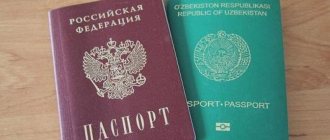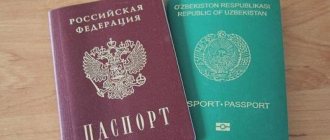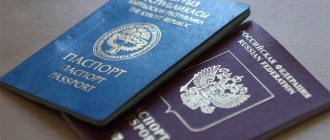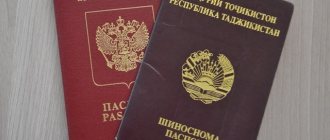Dual citizenship
Russian and international legislation provides for dual citizenship - having simultaneous citizenship (or citizenship, if the form of government is a monarchy) of two states.
People with two or more passports are called bipatrids. Of great importance is the fact that an international agreement has been signed between both countries - a document indicating the difference between dual citizenship and second citizenship. With its help, legal relations are regulated. Currently, Russians have the opportunity to obtain dual citizenship in only two countries: Tajikistan and Turkmenistan. There was a draft of a similar agreement with Ukraine, but it did not reach the final stage.
The relocation of a citizen of one country to the territory of another, whose passport was issued to him, automatically releases the person from duties to the state he is leaving. At the same time, the responsibilities of a citizen of the country to which the move was made become relevant for him.
If we are talking about the Russian Federation and Turkmenistan, then it is enough to undergo military service in one of the countries. Taxes must be paid only to the treasury of the state in which the citizen permanently resides or is officially employed. If a person has two citizenships, but there is no corresponding agreement between states, then there is a risk that each of the countries will make claims to him for full taxation.
Military service and taxes are not a complete list of privileges for a citizen of two countries. The advantages of dual citizenship also include the following:
- children born in a marriage of binationals can choose any citizenship or both at the same time;
- you can leave the Russian Federation with a national passport and enter the territory of another state with another document;
- there are no problems with obtaining a visa;
- simplification of the border control procedure.
But you also need to know that in the event of property disputes, the laws of the state in whose territory the real estate is located are in force. That is, it is prohibited to purchase and register, for example, a house in the Russian Federation, based on the legislation of Tajikistan. The process of doing business and economic transactions are similar: dual jurisdiction and choice do not work here.
In this aspect, the legislation of the country in whose territory the business activity is carried out has an advantage. If the business is related to the transportation of goods, customs activities, the border of taxation and jurisdiction runs along the real border. Each state has its own laws and taxes.
The central office in the Russian Federation implies a mandatory fee for all Russian companies, and if it is located in a second country, the activities of the enterprise are regulated by laws on foreign capital. For the owner, a more profitable option is the organization's representative offices in both countries (with a division of activities within the territory of each country).
In case of loss of a Russian passport on the territory of another state, the binational will need a certificate for return. After receiving it, the citizen can return to the Russian Federation and restore his identity document.
Let's sum it up
So, dual citizenship is a more profitable option, since a person bears tax, military and other obligations in only one country, and such citizenship is also passed on to children. However, this option is only available if there is an international agreement between the countries, and Russia has concluded this agreement only with Tajikistan and Turkmenistan.
Second citizenship comes with twice as many responsibilities. But you can apply for it in almost any country; the process of obtaining a passport is quick and simple.
Share with your friends:
Second citizenship
The absence of treaties between other states and the Russian Federation means that two or more citizenships are possible, but in the form of a second citizenship.
The Constitution does not prohibit a second passport from any other country. The desire to become a subject of another state will not serve as a reason to renounce Russian documents and privileges. Of course, it is important to comply with the rules for obtaining a new passport within the framework of the Federal Law “On Citizenship of the Russian Federation.” The main difference between a second citizenship and a dual citizenship is that a person retains obligations to each country regarding the payment of taxes, conscription for military service (if there are no exceptions, he will have to serve twice), and so on.
The laws of some states prohibit second citizenship . European countries that are inaccessible to Russians in this sense include Norway, Germany (although children of migrants have received the right to dual citizenship) and Denmark. In contrast, individual countries are relieved of the obligation to make public information about the acceptance of their citizenship. For example, the Russian authorities will not be aware that a citizen of the Russian Federation has received a Hungarian passport.
However, this should not be regarded as an opportunity to ignore legal obligations to both countries.
Rights and obligations of persons with dual and second citizenship

The difference between two citizenships and dual citizenship lies in the powers and obligations of the parties - citizens and states that entered into an agreement.
Rights and responsibilities of Russians who have received foreign status:
- submitting a notification to the Department of Internal Affairs of the Department of Internal Affairs within two months after acquiring citizenship or within a month after returning to your homeland;
- the use of only Russian documents in the Russian Federation, since only Russian citizenship is recognized on the territory of the country;
- the same rights and obligations that other citizens of the Russian Federation have;
- the opportunity to choose citizenship for your children;
- use of social assistance from both countries;
- entrepreneurial activity, training, employment in any of the countries or both at the same time;
- visa-free visits to states with which an agreement of the same name has been signed.
Rights and obligations of persons with dual status:
- filing a notification of dual status;
- rights and obligations specified in an international agreement: payment of taxes in only one state; conscript service in only one state; social assistance only in the country of residence (the applicant will not be able to apply for a pension or other social benefits in two countries at the same time) and others (the opportunity to participate in elections or be elected to the presidency); employment, healthcare, education in one of the countries;
- the ability to choose citizenship for the child;
- use of a visa-free regime for both states, as well as a number of other rights and obligations that are stipulated in the international agreement.
Geography of two passports
The ban on obtaining a second citizenship is in force in Ukraine, India, Kazakhstan, China, Japan, and South Korea. In the United States, renunciation of previous citizenship is required. In many countries, applying for a new passport allows you to keep your original one. Such states include:
- Belgium;
- Romania;
- Canada;
- Brazil;
- Türkiye;
- Cyprus;
- Finland;
- Greece;
- Israel;
- Ireland;
- Dominican Republic;
- Jamaica;
- In Spain you can have two documents only from some countries;
- In Argentina, if the second passport is Italian or Spanish;
- Chile (agreement only with Spain);
- Lithuania (in case of return of citizenship, if the deprivation occurred before the age of majority, persons are exempt from the need to renounce another citizenship);
- Latvia (preservation of previous citizenship upon restoration is allowed for persons who emigrated from the Republic of Latvia in 1940-1990, as well as for their descendants).
List of countries where dual citizenship is allowed
These countries include the following:
- Argentina: you can obtain Italian or Spanish citizenship;
- Brazil;
- Greece;
- Dominican Republic;
- Israel;
- Spain: the population is also offered only a limited list of countries in which it is allowed to obtain citizenship;
- Ireland;
- Latvia: People who emigrated from 1940 to 1990 and their children and grandchildren have the opportunity to retain their previous citizenship while regaining Latvian citizenship.
- Lithuania: if a person was deprived of Lithuanian citizenship before the age of 18, then upon his return there is no need to formalize a renunciation of another citizenship.
- Russia: the country has entered into an international agreement with Tajikistan and Turkmenistan;
- Türkiye;
- Chile: you can apply for a Spanish passport;
- Jamaica;
- Germany: Children of migrants have the right to retain a German passport and citizenship of their parents' home country after they reach 23 years of age (previously, they had to choose only one citizenship upon reaching the age of 23).
In South Korea, China, Japan, Denmark, Norway, Ukraine and some other countries, dual citizenship is prohibited.
Nuances of receiving
You should not count on easy and quick receipt of a second identity document in some EU countries (for example, the Netherlands or France).
In the best case scenario, anyone wishing to replenish their number of passports will have to live in the country with a residence permit status for about 5-6 years before changing it to permanent residence. After this, he will have the opportunity to apply for citizenship (after about a decade). The situation is not hopeless . It is worth paying attention to special investment programs that are created to maximize the simplification of the procedure, time and other costs of obtaining citizenship in a number of EU countries.
The choice of country is determined by the purpose of a particular person and his capabilities. If a person is interested in developed countries, he should pay attention to the proposals of Austria. Hungary is considered a fairly economical option. The best option in terms of price and complexity is Malta, whose citizenship provides many advantages. To attract immigrants, some states offer additional opportunities for purchasing a passport:
- by ethnicity (Israel and Greece);
- through investments (New Zealand, Ireland and Australia);
- to attract workers (many European countries).
Most often, Russians give preference to European countries, since it is closer than South and North America, and it is also simpler. Together with the passport, the rights to reside, travel, work and own a business are acquired. In some countries, certain conditions are provided for obtaining citizenship (for example, having relatives or investing in the economy).
Many European countries offer programs aimed at attracting investors. This is a chance for wealthy residents of Russia. Typically, people who want to obtain two documents of identification are expected to purchase real estate, invest in emerging industries or government bonds.
One of the most profitable options is Cyprus. This country has low investment, but a decent standard of living.
Europeans can obtain visas to the UK, USA, New Zealand or Australia in a simplified manner. The rules and laws of each European state are individual, so an identity document from one country may be more accessible than a passport from another.

In most cases, you need to take four steps: legal entry into the state, obtaining a residence permit, and then permanent residence and obtaining citizenship. The reason for obtaining a residence permit in any European country may be:
- marriage with a resident of the state;
- refugee status;
- buying a property;
- official employment;
- return to their historical homeland;
- family reunification if the nationals of the country are close relatives;
- opening a business, providing jobs for local residents;
- investments in priority areas.
A person who has a residence permit must live in the territory of the chosen state for at least a year in order to obtain the right to permanent residence. But if he has problems with the law, the procedure can become significantly more complicated. A candidate for permanent residence must prove the availability of housing, official employment and stable income. With this status, a citizen has almost all the rights of residents of the country, and after a certain time the opportunity to obtain a passport. As a rule, this takes three years.
For candidates for second citizenship, the requirements for obtaining permanent residence are relevant, to which are added exams on knowledge of the language, laws, and history of the country. On average, the process lasts from several months to several years. The requirements are elementary, and compliance with the full list of conditions guarantees a positive decision.










